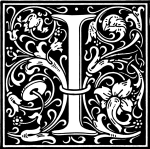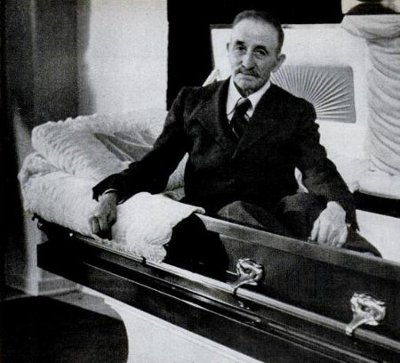“I have lived some thirty years on this planet, and I have yet to hear the first syllable of valuable or even earnest advice from my seniors.” — Thoreau
Author: Greg Ross
The Bouba/Kiki Effect

In 2001, USCD psychologist Vilayanur Ramachandran presented these shapes to American undergraduates and to Tamil speakers in India. He asked, “Which of these shapes is bouba and which is kiki?” Around 98% of the respondents assigned the name kiki to the spiky shape and bouba to the curvy one.
Psychologist Wolfgang Köhler had found a similar effect in 1929 using the words baluba and takete. “This result suggests that the human brain is somehow able to to extract abstract properties from the shapes and sounds,” Ramachandran wrote, “for example, the property of jaggedness embodied in both the pointy drawing and the harsh sound of kiki.”
Self Important

English is the only major language to capitalize its first-person singular pronoun.
“How monumentally imposing is that upper case ‘I’!” wrote Henry Van Dyke in 1920. “If a writer is egoistic the capitals stretch across his page like a colonnade. When he writes ‘we,’ he descends to the lower case.
“But this orthographic solipsism, mark you, is shared by Americans, Canadians, Australians, New Zealanders,–all who use the English tongue. It is therefore not to be set down to insularity, but to individualism,–a stark, ineradicable, valuable quality of these various folks whose thoughts and feelings have been nourished by the same language.”
Dry Run

In 1951 Colorado farmer Jim Gernhart held a rehearsal of his own funeral. He watched as eight pallbearers carried a casket from his home to a waiting hearse, then attended it to the local armory, where almost half of Burlington, Colo., turned out for a funeral sermon by the Rev. S.H. Mahaffey.
Gernhart also bought a $465 headstone and a cemetery lot, and the local newspaper even published an obituary. “Real nice funeral, ain’t it?” Gernhart remarked. “Does a man good to see so many people out to bury him.”
Apple Piety
But my favourite example is a story told by the American linguist Charles Hockett, who reports that at least one Filipino father, during the American occupation of the Philippines, named his son Ababís — after the patron saint of the United States. But no such saint exists. So what happened?
Well, before the Americans arrived, the Philippines were a Spanish colony, and Spanish was widely spoken. In Spanish, the word for ‘saint’, when it occurs in a male saint’s name, is San — hence all those California place names like San Francisco, San José and San Diego. The Filipino father had noticed that American soldiers, in moments of stress, tended to call upon their saint by exclaiming San Ababís! — or something like that.
— Robert Lawrence Trask, Language: The Basics, 1999
“I once had a student named Usmail, which I at first thought was some Hispanic version of Ishmael,” writes CUNY linguist Leonard R.N. Ashley. “It transpired that he had been named for the only contact his family in a remote Puerto Rican village enjoyed with the outside world, the red-white-and-blue truck that came frequently and had painted on its side US Mail.”
“In Nyasaland, Africa, a native tribe got into the custom of taking names from a publisher’s catalogue which had fallen into their hands. Their Chieftain took for himself the name of Oxford University Press.” — Mario Pei, The Story of Language, 1966
The Spider Man of Moncrieff Place
On Oct. 17, 1941, 73-year-old Philip Peters was found bludgeoned to death in the kitchen of his Denver home. All the doors and windows were locked. His wife, who had been away at the time, returned to the home with a housekeeper, and both heard strange sounds throughout the ensuing weeks. Finally both moved out.
Police were checking on the vacant house the following July when they heard a noise on the second floor. An officer ran upstairs in time to see a man’s legs disappearing through a small trapdoor in the ceiling of a closet.
The trapdoor led to a narrow attic cubbyhole in which 59-year-old Theodore Coneys had been living for 10 months. He had broken into the house the previous September and had been living silently in the attic for a month when Peters discovered him one night at the refrigerator. After the murder he’d returned to the cubbyhole and had remained there ever since.
He confessed to the crime and was sentenced to life in prison.
Local Showers
TOPEKA, Kan., Nov. 17.–The story of a wonderful phenomenon comes from Rossville, a little town nineteen miles west of Topeka on the Union Pacific. For nineteen days, it is said, rain fell incessantly on the orchard belonging to H. Klein, a prominent Rossville resident.
This orchard is in the town, and is bounded on the east by Mr. Klein’s residence, on the other three sides by lines of fences shutting off cultivated fields. The rain did not fall outside of Mr. Klein’s premises, but for nineteen days there was no intermission in the fall, and it was only stopped by the present cold snap. What caused this persistent rain over one orchard, when other orchards in the immediate neighborhood were needing water and not getting it, is puzzling the people of that village. Several hundred people witnessed the phenomenon, and the rainfall is the local sensation at Rossville.
— New York Times, Nov. 18, 1891
A Shiny Lemon
In 1929 a well-dressed man approached Tony and Nick Fortunato, owners of New York’s Fortunato Fruit Company. He identified himself as T. Remington Grenfell, vice president of the Grand Central Holding Corporation, and he told the brothers that Grand Central Station had decided to shut down its information booth. If they could come up with $100,000, the first year’s rent, they could take over the booth and convert it into a fruit stand in the heart of the busy train station.
Overjoyed, the brothers brought $100,000 to the corporation’s offices. There they met the president, Wilson A. Blodgett, who accepted their money and gave them a contract saying they could take over the booth on April 1. But when they arrived at the station to begin renovations, they found employees operating the booth as normal, and when they began to argue officials kicked them out of the station. They returned to the Grand Central Holding Company but found an empty suite.
The Fortunato brothers never got their money back, and Grenfell and Blodgett, whoever they were, were never caught. But for years afterward the brothers would visit Grand Central Station regularly to castigate the employees there — a spectacle that itself became a small-time tourist attraction.
Square Deal

Point A is the center of one square and the vertex of another. The side of each square is 4 inches. What is the area of the shaded region?
“Deer Have a Deep Sense of Wrong”
Animals of the deer tribe seem to have a deep sense of any wrong done to any member belonging to them, and to show a determined disposition to avenge that wrong at the first opportunity. Captain Brown states that, ‘At Wonersh, near Guildford, the seat of Lord Grantley, a fawn was drinking in the lake, when one of the swans suddenly flew upon it and pulled it into the water, where it held it under until it was drowned. This act of atrocity was noticed by the other deer in the park, and they took care to revenge it the first opportunity. A few days after, this swan, happening to be on land, was surrounded and attacked by the whole herd, and presently killed. Before this time they were never known to attack the swans.’
— Vernon S. Morwood, Wonderful Animals, 1883

